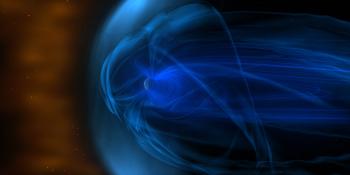Viewing archive of Wednesday, 2 April 2003
Solar activity report
Any mentioned solar flare in this report has a scaling factor applied by the Space Weather Prediction Center (SWPC). Because of the SWPC scaling factor, solar flares are reported as 42% smaller than for the science quality data. The scaling factor has been removed from our archived solar flare data to reflect the true physical units.
Report of Solar-Geophysical Activity 2003 Apr 02 2200 UTC
Prepared by the NOAA © SWPC and processed by SpaceWeatherLive.comJoint USAF/NOAA Report of Solar and Geophysical Activity
SDF Number 092 Issued at 2200Z on 02 Apr 2003
IA. Analysis of Solar Active Regions and Activity from 01-2100Z to 02-2100Z
Solar activity was at low levels. There were 4 minor
C-class flares from Regions 321 (N07W40) and 324 (S12W21).
IB. Solar Activity Forecast
Solar activity is expected to be low.
There is a small chance for an isolated M-Class flare from Regions
321 (N07W40), 323 (S07W56), 324 (S12W21), or 325 (N10E04).
IIA. Geophysical Activity Summary 01-2100Z to 02-2100Z
The geomagnetic field was at unsettled to active levels. The high
speed stream that began on 30 March has gained slightly in strength
to nearly 580 km/sec. Intermittently southward Bz has
generated disturbed periods. The greater than 2 MeV electrons at
geosynchronous orbit reached high levels.
IIB. Geophysical Activity Forecast
The geomagnetic field is
expected to be at quiet to minor-storm levels due to the continuing
high speed stream, and potential for southward Bz. The high speed
stream should diminish tomorrow, and the geomagnetic field should
end the day at quiet levels.
III. Event Probabilities 03 Apr to 05 Apr
| Class M | 30% | 30% | 30% |
| Class X | 05% | 05% | 05% |
| Proton | 01% | 01% | 01% |
| PCAF | green
|
IV. Penticton 10.7 cm Flux
Observed 02 Apr 158
Predicted 03 Apr-05 Apr 155/155/150
90 Day Mean 02 Apr 135
V. Geomagnetic A Indices
Observed Afr/Ap 01 Apr 011/012
Estimated Afr/Ap 02 Apr 021/019
Predicted Afr/Ap 03 Apr-05 Apr 015/015-012/012-010/010
VI. Geomagnetic Activity Probabilities 03 Apr to 05 Apr
| A. Middle Latitudes |
|---|
| Active | 40% | 30% | 25% |
| Minor storm | 15% | 10% | 10% |
| Major-severe storm | 05% | 05% | 05% |
| B. High Latitudes |
|---|
| Active | 45% | 40% | 35% |
| Minor storm | 20% | 10% | 10% |
| Major-severe storm | 10% | 05% | 05% |
VII. Comments: Beginning 1500 UTC April 8, SEC will begin using data from the GOES 12 satellite, and stop receiving GOES 8 data. GOES 12 has the new Solar X-Ray Imager (SXI), which will acquire real-time, operational images of the solar x-ray flux. With the switch from GOES 8 to GOES 12, the primary/secondary designations will change. GOES 12 will be the primary satellite for the SXI. All other data, including magnetometer, XRS x-ray measurements, and energetic particles, will have GOES 10 as their primary source, with GOES 12 as the secondary source where available. Please see http://www.sec.noaa.gov/GOES.html for important information on this changeover.
All times in UTC
<< Go to daily overview page



